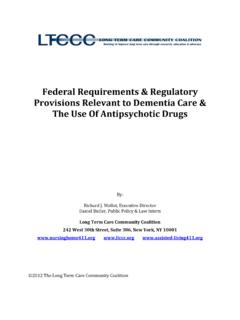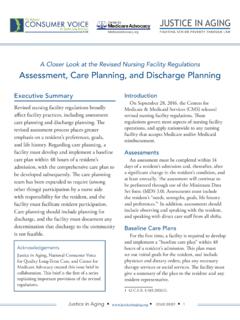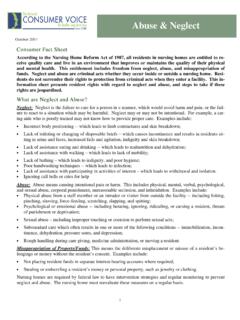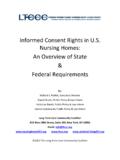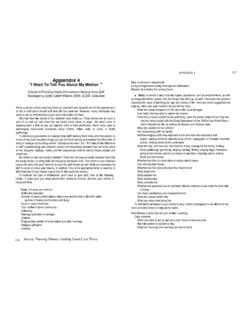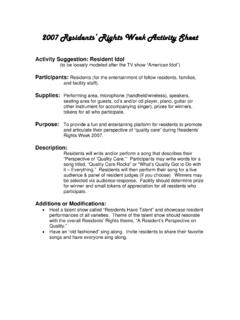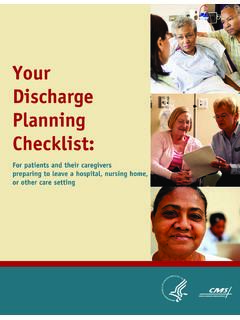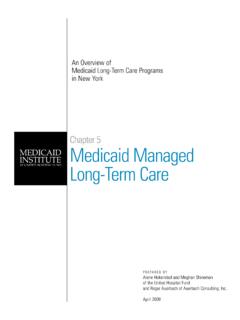Transcription of Federal Requirements of Participation for Nursing …
1 Federal Requirements of Participation for Nursing Homes Summary of key changes in the Final Rule Issued September 2016. On September 28, 2016, the Centers for Medicare & Medicaid Services (CMS) issued updated Federal Nursing home regulations ( Requirements of Participation for Long-Term Care Facilities). This is the first comprehensive revision to the regulations since they were issued in 1991. The updated rule (also referred to as the final rule ) is being implemented in three phases: Phase 1-November 28, 2016; Phase 2 - November 28, 2017; and Phase 3-November 28, 2019. This summary provides a brief overview of key changes in the sections on Resident Rights; Freedom from Abuse, Neglect, and Exploitation; and Admission, Transfer and Discharge that will go into effect in Phase 1. The purpose of the summary is to highlight what is different between the prior rule and the final rule. A summary of additional sections of the final rule will be issued in the near future.
2 Changes in the rule are indicated in two ways: NEW means that the language is completely new. means that a prior regulation has been revised in some way. Some language has either MODIFIED. been deleted or revised, or new language has been added. Instances where the content of the prior and final rule are the same, but there is a slight variation in phrasing, have not been included. DEFINITIONS. NEW Abuse Adverse event Exploitation Misappropriation of resident property Neglect Person-centered care Resident representative Sexual abuse Composite distinct part MODIFIED. Nurse aide Common area 1. RESIDENT RIGHTS. Many provisions previously in other sections of the regulations have been moved to Resident Rights: From Quality of Life: Promoting maintenance or enhancement of resident quality of life; dignity Self-determination Participation in resident and family groups Participation in other activities Accommodation of needs Environment From Resident Behavior and Facility Practices: Freedom from physical and chemical restraints (a) Residents Rights NEW (2) Equal access to quality care must be provided regardless of diagnosis, severity of condition and payment source.
3 (b) Exercise of rights. The rule uses a new term resident representative. See definition section in the regulations. Note that the term now includes an individual, other than an agent under a power of attorney, chosen by the resident to act on the resident's behalf. MODIFIED (2) The facility must support the resident in exercising his/her rights. For residents not adjudged incompetent by a state court: (3) Same sex spouses and opposite sex spouses must be treated equally. NEW. NEW (3)(i) A resident representative can only exercise those rights specifically delegated to him or her. NEW (3)(ii) The resident retains the right to exercise those rights not delegated to a resident representative. NEW (5) The facility can only allow the resident representative to exercise the rights specifically delegated to him/her by the resident. 2. NEW (6) The facility must report any concerns that a resident representative is making decisions or taking actions that are not in the resident's best interests in the manner required under state law.
4 For residents adjudged incompetent by a state court: NEW (7) The court-appointed resident representative can only exercise those rights given to him/her by the court. NEW (7)(i) The resident retains the right to make decisions that are outside the resident representative's authority. (7)(ii) The resident representative must consider the resident's wishes and preferences. NEW. (7)(iii) The resident must be given the opportunity to participate in the care planning NEW. process. (c) Planning and implementing care (2) The regulation expands resident involvement in and control over the care planning NEW. process. Residents now have the explicit right to: Identify individuals or roles to be included in the planning process Participate in establishing goals, outcomes of care and type/amount/frequency/. duration of care Request meetings Request revisions to the person centered care plan Receive the services and items in the plan of care See the care plan Sign after significant changes NEW (3) The facility now has an affirmative duty to support the resident's right to participate in his or her treatment.
5 The planning process must: Facilitate the inclusion of the resident and/or resident representative Include an assessment of the resident's strengths and needs Integrate the resident's personal and cultural preferences into developing care goals 3. MODIFIED (4) Residents have the right to be informed in advance about the type of caregiver or professional that will provide care. NEW (5) Information and choice have been broadened to include elements of informed consent. Residents have the right to: Be informed in advance by the practitioner of the risks and benefits of proposed care, treatment and treatment alternatives or treatment options Choose the alternative or option the resident prefers (6) The right to refuse treatment and refuse to participate in experimental MODIFIED. research has been expanded to include the right to request and/or discontinue treatment and to participate in research.
6 (d) Choice of attending physician (2) & (4) If a resident's physician is not following Federal Requirements , the facility can NEW. seek an alternate physician. However, the facility must discuss this with the resident, and honor the resident's choice of physician if the physician meets the Requirements . (This is former interpretive guideline language that has been made into regulation.). (3) The facility must also provide contact information for the resident's other primary MODIFIED. care professionals, not just the attending physician. (e) Respect and dignity (5) The resident has the right to share a room with his or her roommate of choice when: MODIFIED. Both residents live in the same facility Both residents consent to the arrangement It is practicable This applies to anyone a resident might wish to have as a roommate sibling, other relatives, same sex spouse, friend, etc. MODIFIED (6) The notice before a resident's room or roommate in the facility is changed must now be in writing and include the reason for the change .
7 (7)(iii) The right to refuse a transfer to another room in the facility now includes the right NEW. to refuse if the only reason is staff convenience. 4. (f) Self-determination NEW The facility is now required to promote and facilitate resident self-determination through support of resident choice. MODIFIED (1) The regulation specifically states that residents can choose sleeping and waking times when exercising their right to choose schedules. In addition, residents can choose their providers of health care services as well as their health care services. MODIFIED (3) The right to participate in community activities has been added. Visitation NEW (4) The rule affirms and explicitly states that residents have the right to receive visitors of their choosing at the time of their choosing. NEW (4)(i)(G) The resident representative is added to the list of people who have immediate access to the resident.
8 MODIFIED (4)(iii) Visits from non-family visitors are now subject to resident consent and reasonable clinical and safety restrictions instead of just reasonable restrictions.. NEW (4)(v) & (4)(vi)(A) The facility must have a written visitation policy and inform residents of their visitation rights, the facility policy, any restrictions, the reasons for the restrictions and to whom the restrictions apply. NEW (4)(vi)(B) The resident's right to receive visitors of their choice is further strengthened by language saying the resident has the right to receive visitors that he or she designates, including a spouse or domestic partner of any sex, another family member, or a friend. (4)(vi)(C)&(D) The facility must ensure all visitors have full and equal visitation privileges NEW. (subject to resident preferences) and not discriminate. Resident and family groups NEW (5)(i) The facility must take reasonable steps, with the approval of the group, to make residents and family members aware of upcoming meetings in a timely manner.
9 5. MODIFIED (5)(ii) Other guests as well as staff and visitors can attend only if invited. MODIFIED (5)(iii) The designated staff person must be approved by the resident or family group. MODIFIED (5)(iv) The facility is now required to act promptly upon grievances and recommendations of groups. The nature of these grievances and recommendations has been broadened to issues of resident care and life in the facility. (5)(iv)(A) A new requirement has been added mandating the facility to demonstrate NEW. their response and rationale for such response. NEW (5)(iv)(B) Acting upon grievances/recommendations does not mean the facility must implement every request as recommended. NEW (6) Residents have the right to participate in family groups. (7) The language has been revised to say that it is the resident who has the right MODIFIED. to have their families or representatives meet with other families/representatives rather than the families or representatives having this right.
10 Financial affairs/resident personal funds MODIFIED (10)(i) The facility must not require a resident to deposit their funds with the facility (language was previously may not ). If the resident authorizes the facility to manage his/her funds, the facility must now act as a fiduciary of the resident's funds. MODIFIED (10)(ii) Separate Requirements have been established for residents whose care is funded by Medicare and Medicaid. (10)(ii)(A) For residents whose care is funded by Medicare: Amounts have been MODIFIED. changed from $50 to $100. MODIFIED (10)(v) The facility must now return residents' personal funds and a final accounting within 30 days when they have been discharged or evicted and not just upon death. 6. Charges for items and services MODIFIED (11) The facility must not impose a charge against the personal funds of a resident for any item or service for which payment is made under Medicaid or Medicare.


